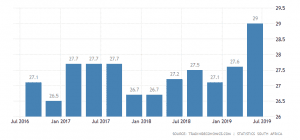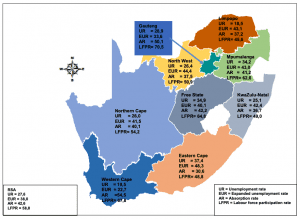You cannot legislate people out of poverty. You cannot regulate jobs into existence. Jobs need to be created, and at the moment, the South African government is slowly but surely suffocating businesses’ ability to create jobs by continuously adding more and more burdens on both employers and the unemployed – the latest being the National Minimum Wage (NMW). The NMW is a disincentive for businesses to employ more people. The only “real” jobs in an economy are found in businesses that are providing goods and services to consumers. All government jobs are paid for by current and future taxpayers.
For the first time in history, the number of unemployed people (as per the expanded definition) is more than 10 million. The higher the price of a good, the less of that particular good people will buy. This basic law of economics is ignored by the government, but it cannot escape the consequences of implementing laws and policies which contradict this law. According to StatsSA, the unemployment rate increased by 1.4 percent points from 27.6 percent in the first quarter of 2019 to 29 percent in the second quarter of 2019.
This means an increase of 455,000 in the number of people who are unemployed. The expanded definition of unemployment, which includes those who have stopped looking for work, is 38.5 percent – 10,226,000 people. SA must change course from policies such as the NMW, which inflate the price of labor and contribute to such an astronomically high unemployment level.

SA’s unemployment rate — Trading Economics
SA’s lack of quality education means that even if people make it through the system, their skills are not developed to a sufficient level for someone to hire them. But let us say the country’s education quality increased exponentially over the next year – more and more businesses are closing down or scaling back growth plans because of continual state interference (in many forms), thus the employment opportunities are drying up faster and faster.
It is not up to the government to create jobs for all South Africans; but it is morally imperative for the government to step out of the way and let people find employment, start businesses, and create jobs.
Furthermore, the NMW (introduced earlier this year) prices many people out of jobs which could while initially low-paying, act as stepping stones to better employment options further down the road. At this point, many unemployed people cannot overcome the many regulatory hurdles placed between them and potential employers.
There is a strong reason to believe that the current situation imposed on unemployed people is the result of willful ignorance on the part of minimum wage advocates. The talk around measures such as minimum wages is always filled with moral language – ‘dignity’ of workers, as one example – but there is nothing dignified about someone who is desperately seeking work, who would negotiate his own contract on his own terms with potential employers, if allowed to do so, but who is blocked by legislation that excludes him from the economy.
We were told by the proponents of the NMW that job losses would be “minimal” – clearly, they are substantial and not minimal. So far in 2019, 34,000 domestic workers have lost their jobs.
The economy is not growing, because of restrictive labor and economic policies, and this means people have less money to invest and to employ others. Adding the NMW wage into the toxic mixture that is the economy does zero to alleviate burdens on already beleaguered employers – it simply makes things worse, not easier.

From a broader economic perspective, SA’s economy is not going to grow any time soon because the government is not adopting pro-growth, which means pro-freedom, policies. Cutting regulations and government spending, lowering taxes, abolishing the NMW – these can all aid in turning around SA’s anti-growth economic climate.
On unemployment specifically, the answer is staring government in the face: introducing the Job Seekers Exemption Certificate (JSEC). The JSEC would exempt unemployed people from the very laws which prevent them from getting a job while ensuring that their rights as workers remain protected under the common law.
It is not morally right for anyone, be they in government or not, to prescribe to someone else the amount for which they ought to work; that is up to the individual to decide for herself what she deems appropriate. Dictating to workers and employers what they should agree to is immoral and removes individual agency from the picture completely.
It is not up to the government to create jobs for all South Africans; but it is morally imperative for the government to step out of the way and let people find employment, start businesses, and create jobs.
Chris Hattingh is Project Manager and a Researcher at the Free Market Foundation. He has an MPhil in Business Ethics from Stellenbosch University. He is the author of published articles on consumer rights, economic freedom, inequality, and individual freedom.


